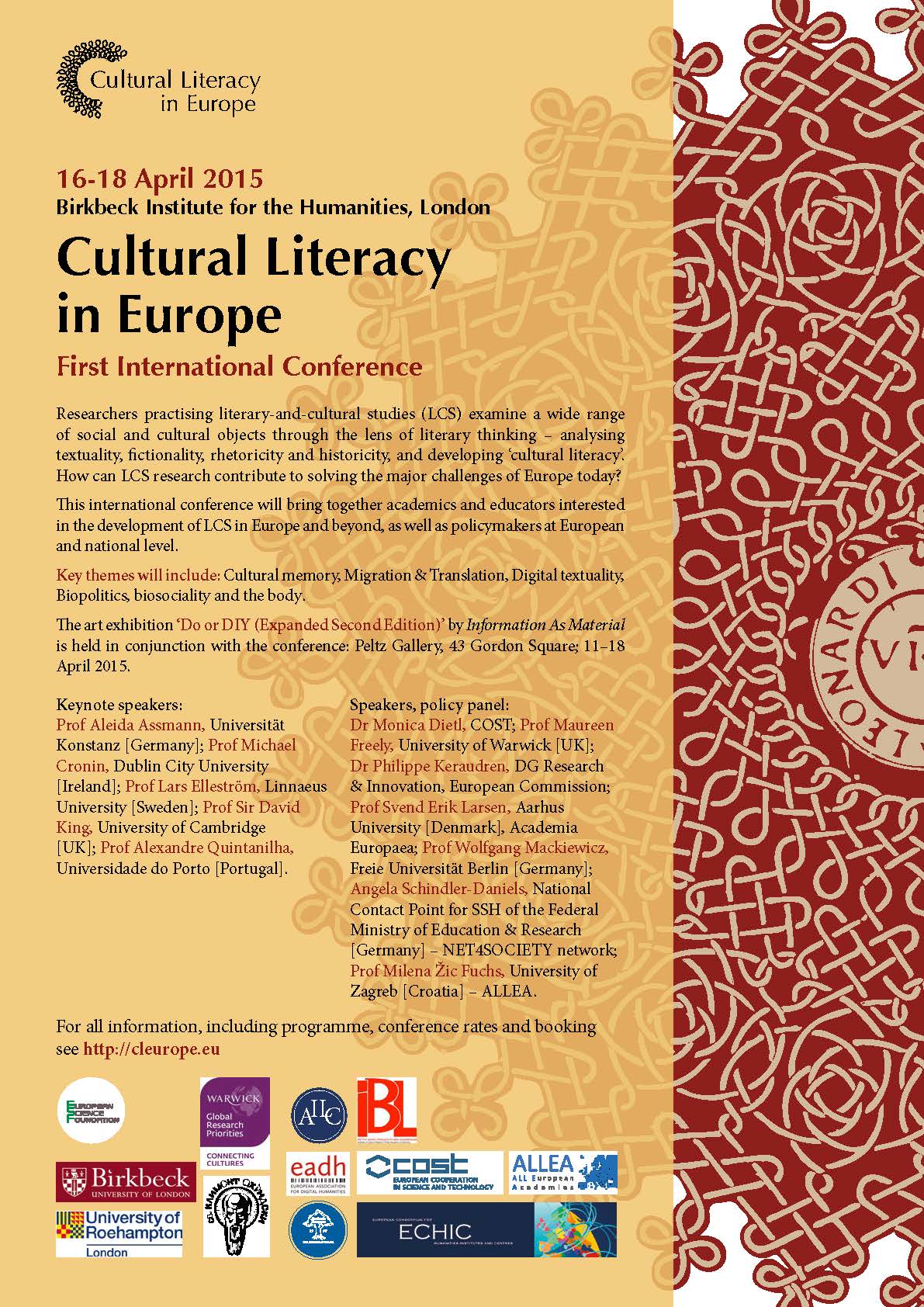De 16 a 18 de abril de 2015, o Instituto de Ciências Humanas Birkbeck, da Universidade de Londres, no Reino Unido, sediará o evento "Cultural Literacy" (Literacia Cultural), o primeiro de uma série de conferências bienais sobre o tema. Este encontro internacional reunirá pesquisadores dos estudos culturais e literários de universidades e organizações de todo o mundo, bem como os formuladores de políticas culturais. A conferência é o primeiro passo para a implementação das recomendações de um projecto de Literacia Cultural na Europa, e marca a inauguração do Fórum Europeu sobre Literacia Cultural.
A conferência de 2015 abrange dois aspectos:
- Debate acadêmico sobre quatro campos estudos culturais e literários (Memória Cultural; Migração e Tradução; Textualidade Eletrônica; Biopolítica, Biossocialidade e o Corpo); e
- Discussão estratégica envolvendo acadêmicos, juntamente com os responsáveis políticos e financiadores convidados.
Sobre
Em 2007, foi criado o Comitê Permanente para as Humanidades e Literacia Cultural da Europa pela European Science Foundation (ESF). Através de uma parceria entre a ESF e a COST, ficou estabelecido que, entre 2009 e 2012, seria desenvolvido um projecto para investigar as seguintes questões:
- Como está o campo interdisciplinar dos estudos culturais e literários e sua relação com os outros campos?
- Como estão os estudos culturais e literários na Europa e se há uma literacia cultural efetiva?
- Como podemos desenvolver e ampliar a contribuição da Literacia Cultural na Europa e quais os desafios?
Para efeito da investigação foram definidos quatro áreas dentro dos estudos culturais e literários:
- Memória Cultural
- Migração e Tradução
- Textualidade eletrônica
- Biopolítica, biossocialidade e o corpo
Os resultados da investigação foram compilados em janeiro de 2013, em uma relatório (PDF) organizado por Naomi Segal e Daniela Koleva, contendo 17 ensaios, “From Literature to Cultural Literacy”, publicada pela Palgrave Macmillan.
Actualmente, o comitê gestor do projecto visa implementar as duas primeiras recomendações do relatório de política científica:
- Criar uma série de conferências (bienal) sobre Literacia Cultural.
- Inaugurar um Fórum Europeu para a pesquisa dos estudos culturais e literários.
Resumos (PDF dos abstracts)
Link dos resumos
Saturday, 18 de abril de 2015, 13:30 horas - Universidade de Londres, Reino Unido
LUSOCOM and the Lusophone/Brazilian communication thought
Abstract: The purpose of this study is to investigate the Cultural Literacy contribution – drawn from the content of
research carried out in universities and disseminated in scientific meetings – to the structuring process of
Lusophone/Brazilian communicational thought. Scientific production in Portuguese – especially from the
transdisciplinary area of Applied Social Sciences: Communication Studies – has got more readers since the
publication in digital format of the proceedings of congresses. The Federation of Communication Sciences
of Lusophone Associations – LUSOCOM, the object of our investigation – has, since 1997, been
disseminating the investigative studies of researchers from Brazil, Portugal, Spain and African Countries of
Portuguese Official Language – PALOPs. We could consider Cultural Literacy as a pedagogical tool for
ultural Literacy in Europe Conference April 2015: ABSTRACTS 10
higher education students in Portuguese-speaking countries, sharing knowledge through dissemination of
intellectual capital produced in this area. Translated theories and concepts have become known in the
Portuguese-speaking world, allowing the universities to undertake joint efforts and starting the
implementation of intercontinental academic partnerships. Then Europe in the knowledge society
rekindles the light of ancient culture through cultural memory revealed in scientific research: translated
books, auteur movies subtitled and re-shown, old photos reprinted, literary journals and daily newspapers
reinterpreted, artworks re-exhibited with details of the creative process, among others. The investigation
seeks to reveal the scope of academic literature in Portuguese-speaking countries of Europe, through the
translation of theories and concepts presented at meetings of scientific societies (Lusocom) from
academic productions, broadening the debate inside and outside universities, and allowing the hegemonic
culture to be reinterpreted from the point of view of the colonized, as an auto-ethnographic analysis.





0 comments